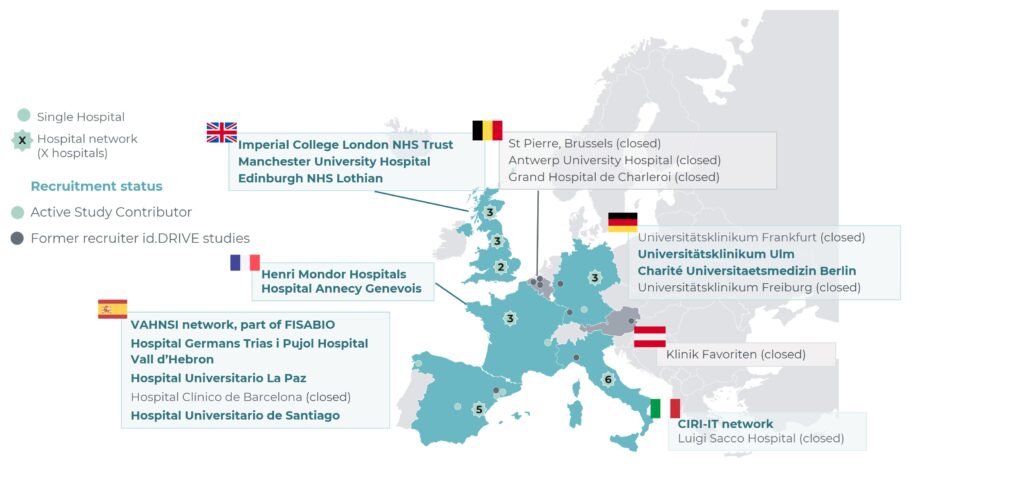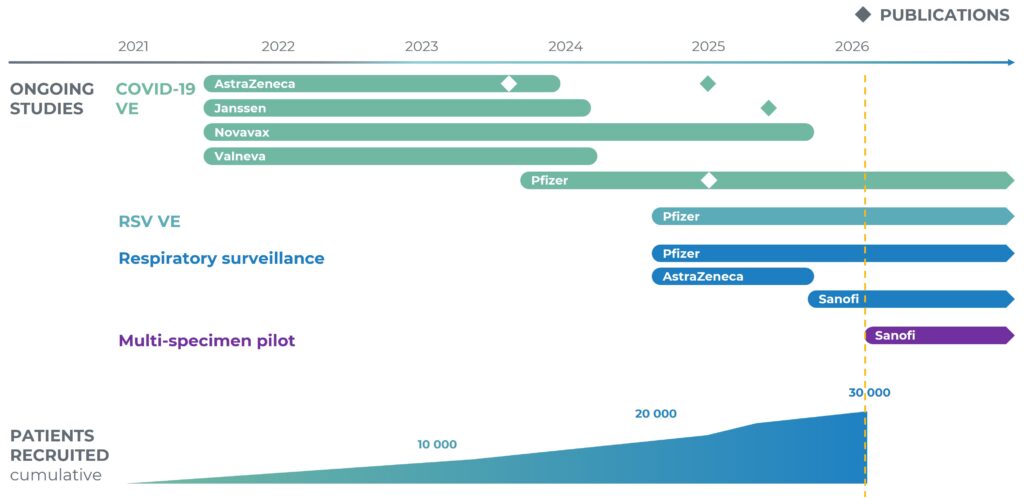STUDIES
id.DRIVE carries out different studies under a common data collection. Three studies are currently running: a respiratory viruses surveillance study, a COVID-19 Vaccine Effectiveness study (CVE), and a respiratory syncytial virus (RSV VE) Vaccine Effectiveness study.
Patient recruitment started in September 2021 for the COVID-19 CVE study. The common data collection was launched on 26 July 2024 by including the surveillance study data, followed by RSV VE data collection in fall 2024. As of 31st December 2025, a total of 30,470 patients have been recruited across 39 hospitals from 21 Study Contributors in 7 European countries.

Surveillance of respiratory viruses
- This yearly study started on 26 July 2024 and acts as an umbrella for the common data collection that feeds the VE studies.
- Multi-country hospital-based study monitoring viral respiratory infections in adults hospitalised for severe acute respiratory infection (SARI).
- The data collection for the 2025-26 epidemiological year runs from 1 September 2025 to 31 August 2026.
- By 31 December 2025, 12,564 patients have been recruited in 33 hospitals across 15 Study Contributors in 5 European countries.
EMA Real-World Data Catalogue EUPAS1000000012
The latest protocol version can be found here.
- Calculate the proportion of positive laboratory samples for viral respiratory pathogens
- Characterise adult SARI patients
- Prevalence of co-infection and impact on healthcare utilisation outcomes
- Pathogen-specific SARI incidences
- Feasibility assessments for future respiratory disease studies
COVID-19 Vaccine Effectiveness
- The study was initiated at the request of AstraZeneca and Janssen in September 2021, and was joined later by Novavax, Valneva, and Pfizer to fulfil their regulatory commitments.
- Multi-country hospital-based test-negative case-control design.
- The data collection has been extended for the 2025-26 season.
- By 31 December 2025, 30,416 patients have been recruited across 36 hospitals in 7 European countries.
EMA Real-World Data Catalogue EUPAS42328.
The latest master protocol version can be found here.
- Brand-specific COVID-19 vaccine effectiveness
- by SARS-CoV-2 genetic variants
- within populations of special interest
- by time since last dose
- by time between doses
- by number or type of doses given prior to last dose
- Brand-specific COVID-19 vaccine effectiveness:
- by severity level
- by calendar time
- by history and calendar time of prior infection
- Effect of vaccination on length of hospital stay
RSV Vaccine Effectiveness
- The study was initiated at the request of Pfizer in fall 2024.
- Multi-country hospital-based test-negative case-control design.
- The data collection has been extended for the 2025-26 season.
- By 31 December 2025, 1,073 patients have been recruited across 13 hospitals in 3 European countries
EMA Real-World Data Catalogue EUPAS1000000035.
The latest protocol version can be found here.
- Brand-specific RSV vaccine effectiveness
- by RSV subtype A and B infection
- by population of special interest
- by time since vaccination
- by calendar time
- by modified SARI severity level
Multi-specimen pilot study
- Pilot study to assess the detection of RSV, human metapneumovirus (hMPV), and parainfluenza virus (PIV) when using multi-specimen collection compared to a single nasopharyngeal swab.
- Aim to gain insights into the possible underestimation of RSV, hMPV, and PIV detection rates in patients with an (severe) acute respiratory infection.
- Prospective cohort pilot study conducted in a network of healthcare settings in Valencia (Spain).
- This pilot study targets the enrolment of approximately 1000 (s)ARI patients.
- Data collection running from 7 January 2026 until 31 July 2026.
- Assess detection rates of RSV, hMPV and PIV in adult (s)ARI patients
- Assess detection rates of RSV, hMPV and PIV:
- by age categories, sex at birth, time since symptom onset categories, setting, diagnosis and common chronic conditions
- Assess RSV detection rates by RSV vaccination status
- Assess SARS-CoV-2 detection rates by SARS-CoV-2 vaccination status
- Assess Influenza detection rates by Influenza vaccination status
- Assess detection rates of co-infections
- Assess detection rates of RSV, hMPV and PIV by subtype or serotype
- Assess detection rates of viral pathogens tested by multiplex panel RT-PCR

